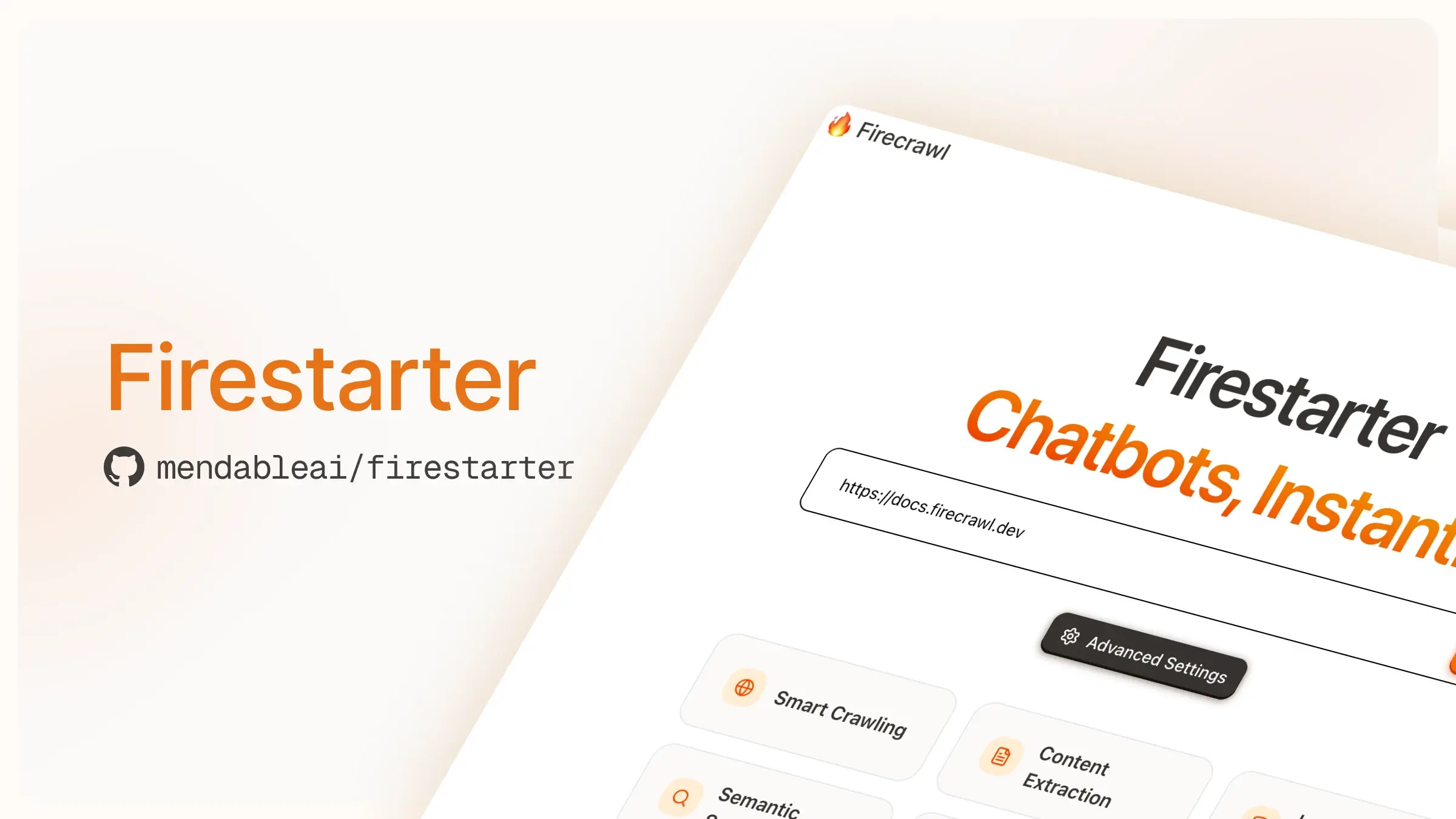
Every developer, product manager, and support team has felt this pressure. Your documentation is great, your website is packed with information, but users still ask the same questions over and over.
You know the solution: a smart, AI-powered chatbot that can answer questions based on your content.
But building a production-grade retrieval-augmented generation (RAG) pipeline is a massive undertaking. It involves scraping, cleaning, chunking, embedding, storing, retrieving, and generating. Third-party services can help, but they often come with limitations (like locking you into their ecosystem).
So, we asked ourselves: What if you could create a production-ready RAG pipeline and a ready-to-use chatbot for any website in under 60 seconds?
This is the story of Firestarter.
Enter a URL. Get a chatbot.
Firestarter is a complete Next.js chatbot-building platform that we've made as simple as possible. It's a new addition to our open-source AI toolbox, designed to make chatbot creation accessible to everyone:
- Enter any website URL (e.g., https://docs.firecrawl.dev)
- Click "Start" and watch as it crawls and indexes the content in real-time
- Instantly get a full-featured chat interface and a developer-ready, OpenAI-compatible API
Behind this simple UI is a sophisticated, pre-built RAG pipeline that handles the entire workflow from raw website to intelligent, queryable data source, powered by Firecrawl for web scraping and Upstash for serverless vector search.
The system is architected to let you build and deploy multiple chatbots based on as many websites as you'd like—each one completely independent with its own data namespace and API endpoint.
How it works: From website to wisdom
Firestarter isn't just a simple script; it's a complete, two-phase system for creating and interacting with knowledge bases.
Phase 1: The indexing engine
When you enter a URL, Firestarter kicks off a meticulous process:
- Smart Crawling: It uses Firecrawl to navigate the site, fetching the clean, structured Markdown content of each page. This bypasses the need to deal with raw HTML, ads, and other noise.
\ - Intelligent Indexing: The content is streamed directly to an Upstash search index. Upstash automatically chunks the text, creates vector embeddings, and stores them in a high-performance, serverless vector database.
\ - Namespace Creation: The entire crawl is isolated under a unique namespace (e.g., firecrawl-dev-1718394041), ensuring each chatbot's data is separate and secure.
\
Phase 2: The RAG-Powered Brain
Once indexed, your chatbot is live. When a user asks a question:
- Semantic Search: Firestarter queries the Upstash index, searching for the most relevant document chunks based on the meaning of the question, not just keywords.
\ - Context-Aware Prompting: The most relevant chunks are compiled into a context block. This, along with the original question, is sent to your choice of LLM—OpenAI, Anthropic, Groq, or any LLM you like. Built with the Vercel AI SDK, there's full flexibility to customize and use any LLM provider you decide to use.
\ - Streaming Response: The LLM generates the answer, which is streamed back to the UI in real-time using the Vercel AI SDK, providing a smooth, human-like chat experience.
\
The best part? Every step is transparent.
And for developers, Firestarter creates something truly special: an OpenAI-compatible API endpoint for every single chatbot.
This means you can use the official OpenAI libraries in any language to programmatically query your website's content, treating it like a structured, intelligent database.
This is just the beginning
Production-grade RAG is complex. Our goal with Firestarter isn't to be a closed, perfect-out-of-the-box solution.
Instead, we want to build a powerful, open source foundation that anyone can use, understand, and contribute to.
The version you see in this repository is our first major step. It works, it provides immense value, but we know there's room to grow. By open-sourcing it, we're inviting you to join us on this journey.
How you can contribute
- Want to add a new vector DB? Fork the repo and show us what you've got
- Think the RAG prompt can be improved? Open a pull request
- Have an idea for a new feature? Start a discussion in the issues
We believe that by building in public, we can create a tool that is not only accessible and affordable but also more robust and adaptable, thanks to the collective intelligence of the open-source community.
We built Firestarter with extensibility at its core. Whether you want to swap in your own services, integrate different LLMs, or customize the crawling logic in firestarter.config.ts, we've made it easy to adapt the tool to your specific needs.
Get started today
We invite you to explore Firestarter. See what it can do, and then dive into the code to see how it's done.
- Try the tool: Firestarter Demo
- Explore the code: View on GitHub
We built Firestarter to make custom AI chatbots accessible to everyone. No massive engineering teams required. Just enter a URL and get started.
Let's build the future of intelligent interfaces. Together.

data from the web